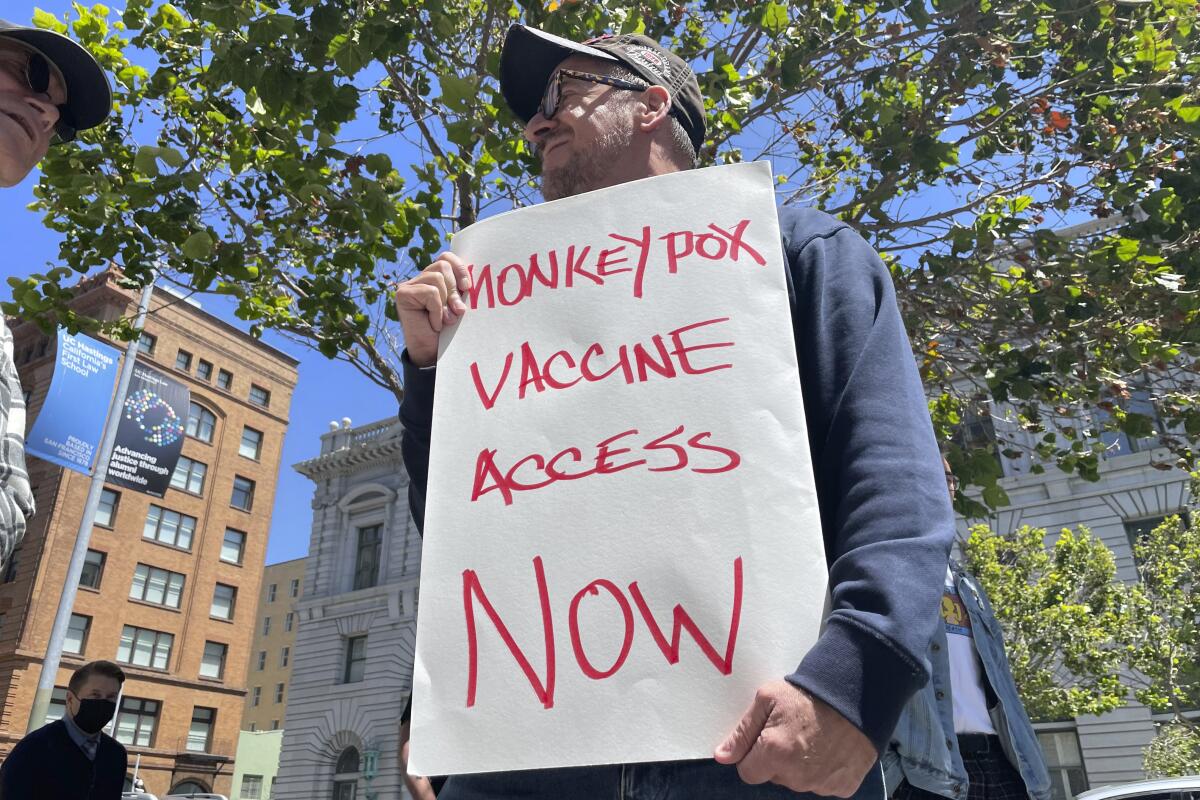
Gov. Gavin Newsom on Monday declared a state of emergency in California over the spread of the monkeypox virus in order to “bolster the state’s vaccination efforts.”
“California is working urgently across all levels of government to slow the spread of monkeypox, leveraging our robust testing, contact tracing and community partnerships strengthened during the pandemic to ensure that those most at risk are our focus for vaccines, treatment and outreach,” Newsom said in statement.
Monkeypox is a rare disease similar to smallpox, though usually milder. It is largely spreading among men who have sex with men as well as transgender and nonbinary people, though health officials warn that anyone can contract the virus through direct contact with infectious sores, scabs or body fluids or by touching clothing and bedding used by a person with the virus.
Nearly 800 cases have been confirmed in California, according to the California Department of Public Health’s most recent data as of Thursday. The state reported that 98.3% of those cases were confirmed in men, the majority of whom identify as part of the LGBTQ community.
The proclamation makes it easier for the state to coordinate its response to the outbreak by ordering all state agencies to follow the direction of the Office of Emergency Services and the California Department of Public Health. The order also boosts vaccination efforts by allowing EMS workers to administer vaccines, which remain in short supply.
Sen. Scott Wiener (D-San Francisco) and several other state lawmakers sent a letter to Newsom and legislative leaders Monday calling for an emergency budget appropriation of $38.5 million to support local monkeypox testing, vaccination, treatment and outreach for the first 90 days of the outbreak.
“The monkeypox outbreak is an emergency, and we need to use every tool we have to control it,” Wiener said in a statement after Newsom’s emergency declaration.
Newsom’s office said California has distributed more than 25,000 doses of the vaccine out of a total of 61,000 doses received to date. That total does not include a separate allocation the federal government directed to Los Angeles County.
The governor’s order said the state is “distributing its limited supply of the vaccine to local health jurisdictions based on a formula that considers current monkeypox cases and number of high-risk individuals.”
Those eligible for the vaccine in L.A. County include anyone who had direct contact with someone with monkeypox or attended a high-exposure event. Also eligible under the county’s guidelines are gay and bisexual men and transgender people who visited a commercial sex venue or other venue where they had anonymous sex or sex with multiple partners in the last three weeks, or who were diagnosed with gonorrhea or early syphilis within the last 12 months or are taking HIV pre-exposure prophylaxis medicine.
The governor’s office said more than 30 facilities and providers across the state are offering treatment for monkeypox, though access to the antiviral prescription drug tecovirimat is also limited.
“We’ll continue to work with the federal government to secure more vaccines, raise awareness about reducing risk, and stand with the LGBTQ community fighting stigmatization,” Newsom said.
Those infected by the virus initially have a fever, aches, swollen lymph nodes, chills and exhaustion. Later they develop a rash, usually starting on the face and then spreading, turning into pus-filled sores before healing.
Monkeypox illnesses typically resolve within two to four weeks but can cause severe pain, hospitalization, long-term symptoms and, in rare cases, death.
Los Angeles County Supervisor Kathryn Barger urged the county to “draw down all the support available to accelerate the distribution of vaccines and resources to those at risk and suffering from this terrible disease” in response to the governor’s order.
“I will work to ensure we’re doing so quickly and efficiently,” Barger said in a statement. “We don’t have any time to waste.”
An investigation into the first case of monkeypox in California in a person who traveled abroad began on May 21 and was confirmed on May 25.
Under the 1970 California Emergency Services Act, the governor has broad authority to respond during a state of emergency. The governor can “make, amend, and rescind” state regulations and suspend state statutes and has the power to redirect state funds to help in an emergency — even funds appropriated by the California Legislature for an entirely different purpose.
The California Supreme Court in 2021 upheld an appeals court ruling that affirmed Newsom’s emergency powers. Two state Republican lawmakers had challenged Newsom’s power after he declared a state of emergency due to the COVID-19 pandemic, arguing he had no right to issue an executive order requiring ballots to be mailed to the state’s 22 million registered voters before the Nov. 3, 2020, election.
The high court ruled the law was constitutional because it required the governor to terminate a declared state of emergency as soon as possible and also allows the Legislature to end it by passing a joint resolution.